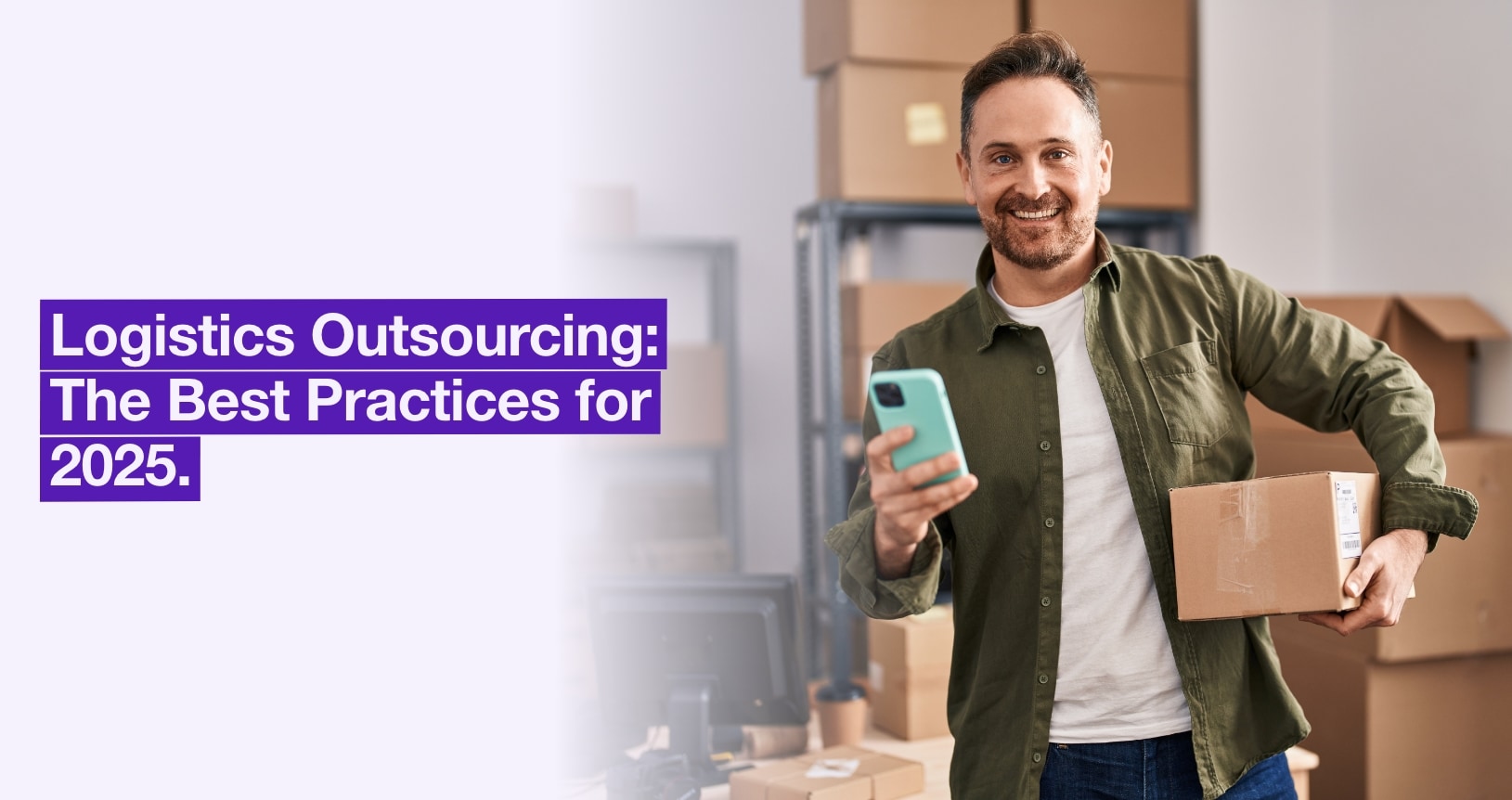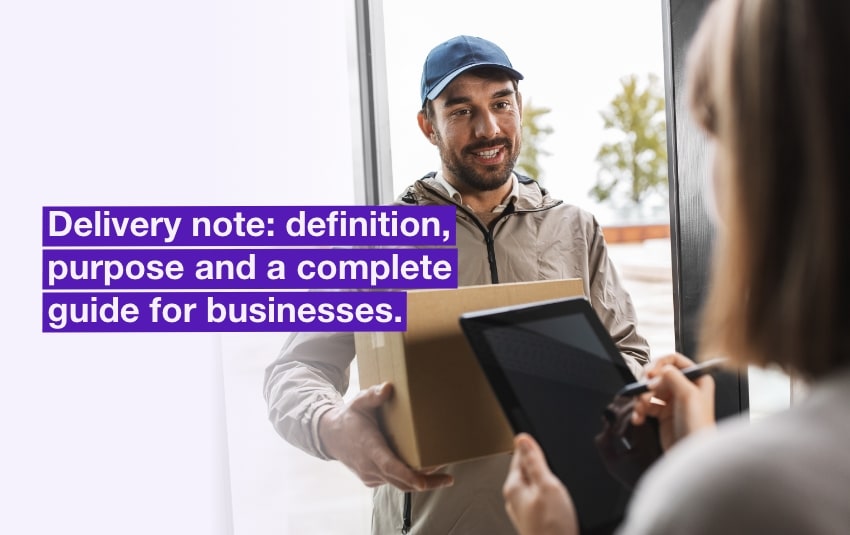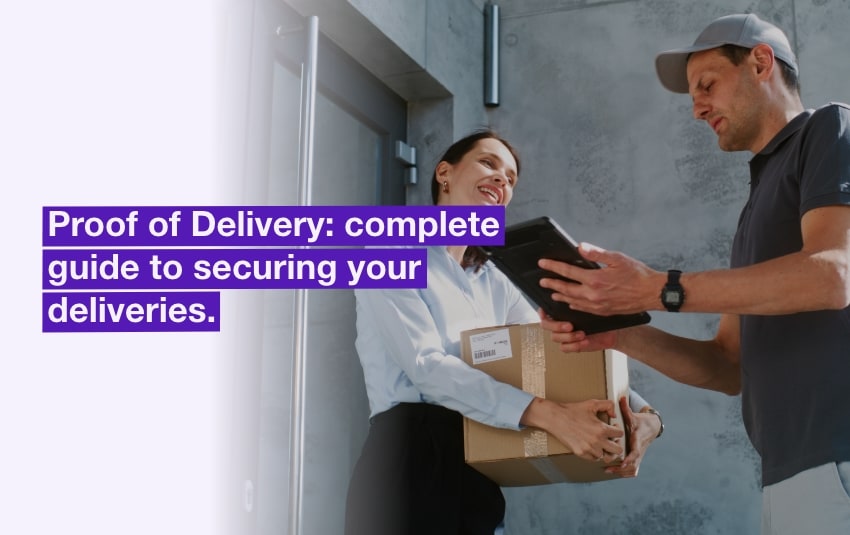Logistics Outsourcing: Best Practices for 2025
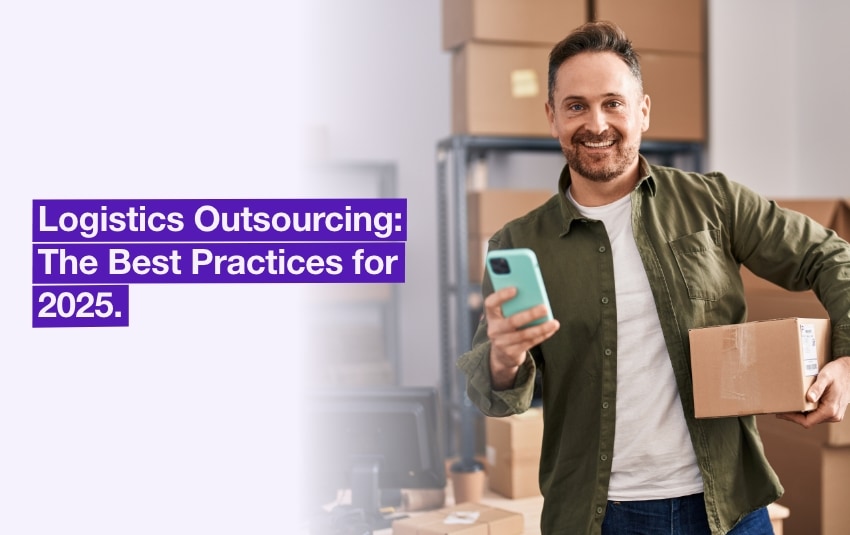
Are you running an online business and wondering whether outsourcing your transport logistics services could be the key to greater efficiency? You’re not alone in considering this option.
Logistics outsourcing, which involves entrusting the management of all or part of your operations to an external service provider, has already proved its worth. Not only does it reduce your costs, it also gives you access to specialist expertise, freeing up your time to concentrate fully on what really matters: developing your business.
In this article, you’ll find out what this means in the transport sector: its benefits, its challenges, as well as the key points to consider when deciding whether this approach is right for your business. Whether you’re looking for a reliable service provider or simply want to optimise your internal processes, this guide will help you decide.
Play Podcast
Logistics Outsourcing: Best Practices for 2025.
Table of contents:
- Logistics Outsourcing: Overcoming Fears and Uncertainties
- What is Logistics Outsourcing?
- Why Considering the Outsourcing?
- When Should I Outsource Logistics?
- The Key Stages in Implementing an Effective Logistics Outsourcing Strategy
- Optimising the Performance of Outsourced Logistics
Logistics outsourcing means entrusting the management of your goods to an expert. For the manager of an online shop, this guarantees greater efficiency in logistics operations.
Logistics Outsourcing: Overcoming Fears and Uncertainties
You’re no doubt aware of just how much internal logistics management can become a real headache. Between the need to cut costs, improve efficiency and meet ever more demanding customer expectations, stress can quickly build up.
Add to that the fear of losing control of your operations or not being able to react quickly enough to unforeseen events, and you have the perfect recipe for particularly arduous day-to-day management. In this context, it becomes important to find appropriate solutions to relieve the pressure.
Logistics outsourcing is an interesting option. It can offer welcome flexibility and the necessary expertise to help you overcome these challenges and navigate more serenely in an ever-changing environment.

The internal management of logistics can become a real headache.
What is Logistics Outsourcing?
Outsourcing your logistics means entrusting the management of your goods to an expert for greater efficiency and peace of mind. By opting for this solution, you can delegate tasks such as goods receipt, storage, order preparation, dispatch and returns management.
In practice, your online shop can be integrated into the service provider’s system. Your goods will be stored in their warehouses, and each order will be automatically packed and dispatched as soon as it is placed. Thanks to the advanced tools provided by these service providers, you will have real-time visibility of all aspects of your logistics, guaranteeing transparency and control.
Why Considering the Outsourcing?
The benefits
- Lower costs: You turn fixed costs into variable costs. You pay only for the services you need, without the heavy investment in infrastructure and technology.
- Focus on core business: Leave logistics tasks to the experts and concentrate on what you do best. A win-win solution for everyone!
- Specialist expertise: Benefit from the experience of professionals who know the nuts and bolts of logistics. Their know-how means you can resolve problems quickly and keep operations running smoothly.
- Advanced technology: You benefit from the latest innovations, such as transport management systems (TMS) and GPS tracking, which are often out of reach for a single company.
- Lower shipping costs: Benefit from advantageous rates thanks to relationships with logistics providers.
- Flexibility and scalability: React more quickly to market fluctuations and seasonal peaks without additional hassle.
- Improved customer satisfaction: Thanks to their expertise and tried-and-tested methods, specialist service providers deliver a quality service that strengthens your customers’ loyalty.
- Vehicle fleet savings: Use carriers without the costs associated with owning, maintaining and managing vehicles.
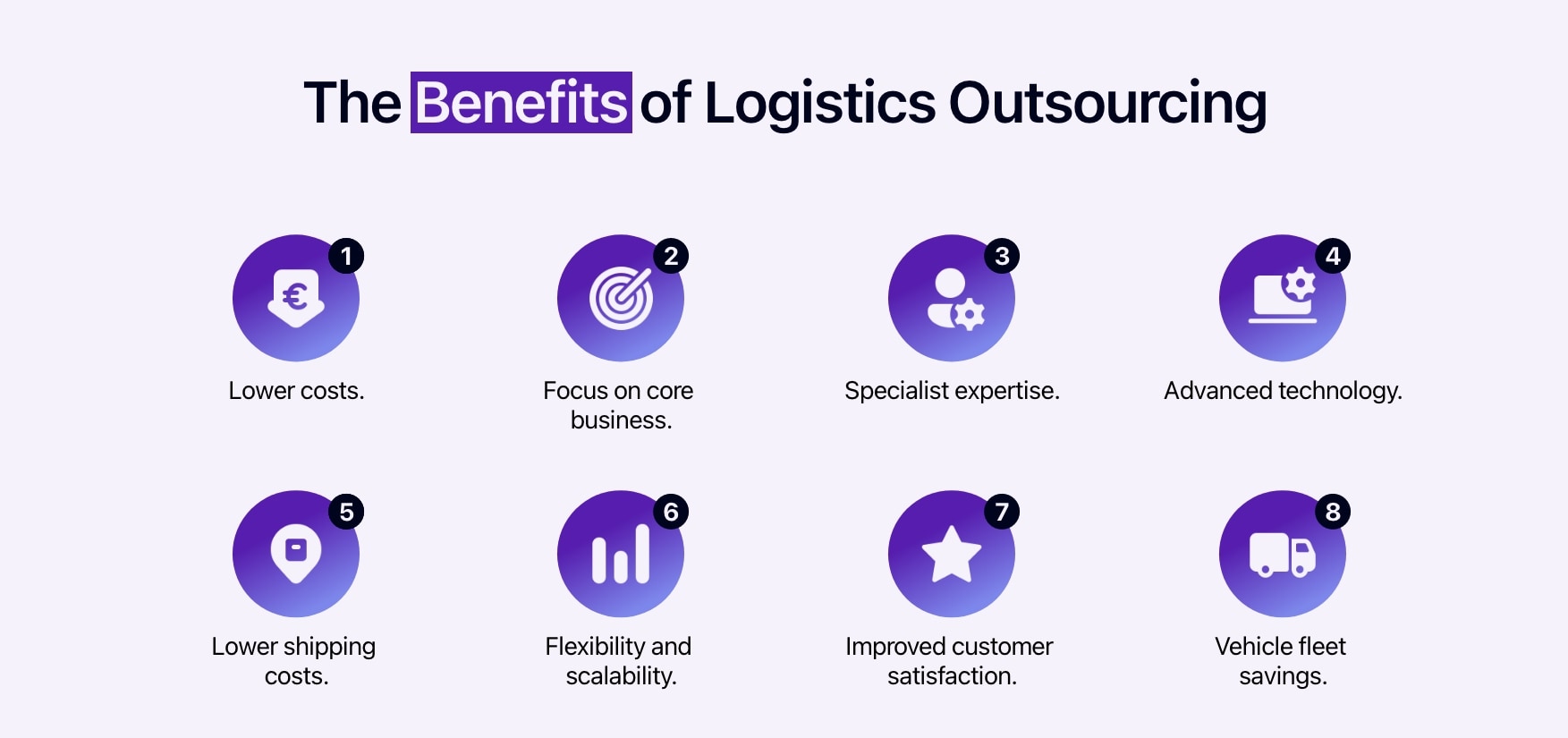
The advantages of logistics outsourcing.
The disadvantages
- Loss of control: Less direct control over operations can be a problem if KPIs are not well-defined. Ensure adequate monitoring and build a relationship based on trust.
- Dependence on third parties: Choose strong partners to avoid service interruptions in the event of financial or operational difficulties.
- Data security: Entrusting sensitive information to a third party exposes you to security risks, such as data leaks and cyber attacks. Make sure the service provider complies with rigorous security standards.
- Strategic misalignment: Check that your objectives are well aligned with those of the service provider to avoid inefficiencies and conflicts.
- Communication issues: Clarify expectations from the outset and establish effective communication channels to avoid misunderstandings and delays.
- Software incompatibility: Ensure software systems are compatible to ensure smooth and efficient data exchange.
- Brand reputation: The wrong service provider can damage your company’s image if problems arise. Choose a reputable provider.
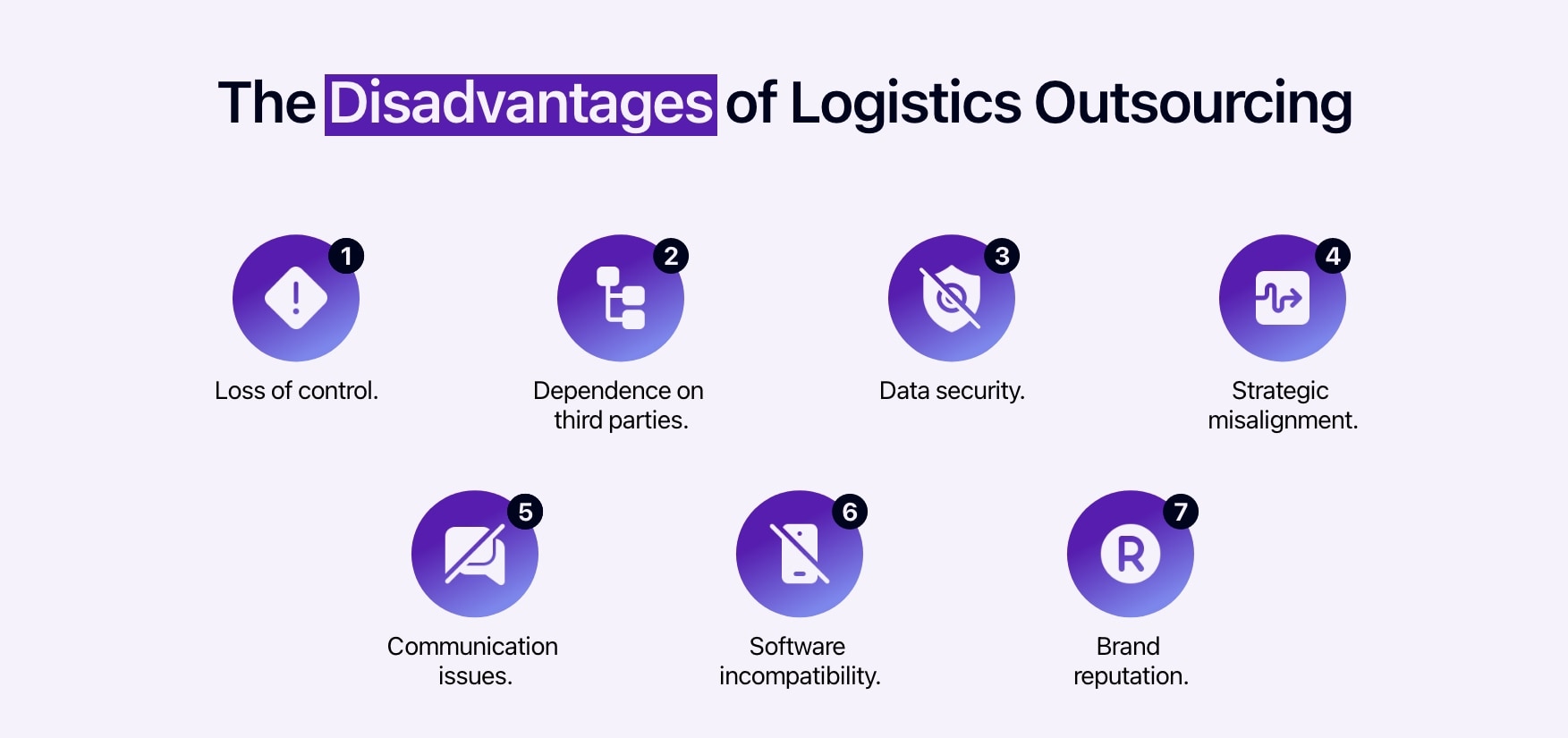
The disadvantages of logistics outsourcing.
When Should I Outsource Logistics?
The signals to look out for
E-commerce sites, whether emerging or already well-established, often have to outsource their logistics when managing shipments becomes too complex. As orders increase, so do the challenges: managing warehouses, recruiting staff… all tasks that end up eating up valuable time and resources.
If managing orders and deliveries is holding you back, or if you’re struggling to keep up with growing demand, it may be time to delegate. Here are some indicators:
- Your logistics costs are soaring, while the quality of your service is falling.
- Your business is growing fast and needs greater flexibility.
- You are entering new markets or finding it difficult to hire logistics staff.
In short, when your logistics needs exceed your capacity, outsourcing becomes strategic.
Cost-benefit analysis: in-house logistics vs. outsourcing
Performance: compare to make better decisions
The dilemma between in-house and outsourced logistics requires an analysis of performance, not just cost. You need to compare the strengths and weaknesses of your in-house operations with those of an external service provider.
To do this, start by defining key performance indicators: delivery times, order accuracy, stock management and last-mile delivery efficiency. These KPIs will help you evaluate the two options. After outsourcing, monitor these indicators to adjust your strategies accordingly.
Costs: optimise your resources
- Identify direct costs: Transport, warehousing, labour, technology and administrative costs.
- Compare with in-house: Compare these costs with those of your current operations.
- Measure efficiency: Calculate the cost per unit shipped or per order processed.
- Estimate savings: Subtract outsourced costs from in-house expenses to determine potential savings.
Financial impact: more than just a question of costs
Outsourcing isn’t just about reducing your costs. It also has a long-term impact:
- Return on investment (ROI): Compare the benefits obtained with the costs incurred.
- Profitability: Check whether it improves customer satisfaction and speeds up orders, which can increase your profits.
Adequacy: a strategic choice
Don’t stop at calculating ROI. It is also important to check that your company’s vision is in line with that of the service provider:
- Strategic alignment: Make sure it shares your objectives for growth and cost reduction.
- Performance monitoring: Regularly assess its responsiveness and ability to adapt to your needs.
- Risk management: Choose a partner capable of managing service interruptions, data security and regulatory compliance.
By combining these elements, you’ll get the extensive overview, helping you to make a decision that will ensure the long-term future of your business.

A cost-benefit analysis enables you to choose between in-house logistics and outsourcing.
Developing a hybrid approach
The hybrid approach combines the best of both solutions: managing certain parts of your logistics in-house while outsourcing more complex or costly tasks. This strategy allows you to keep control of key aspects while benefiting from the expertise of an external service provider.
For example, you can keep stock management in-house, where your team knows your products inside out, while outsourcing last-mile delivery to a partner.
Why should I opt for the hybrid approach?
- Flexibility: Adjust your operations according to the season or peaks in demand.
- Control: Keep control of strategic elements while delegating operational tasks.
- Cost reduction: Outsource what can be done more efficiently and at lower cost.
- Agility: Adjust your processes quickly without compromising service quality.
This approach is ideal for growing with your business, managing seasonal peaks, and accessing advanced technologies without heavy in-house investment.
The Key Stages in Implementing an Effective Logistics Outsourcing Strategy
1. Analysis of needs
Outsourcing logistics is a strategic decision for SMEs, and one that needs to be prepared for with care. The first step is to draw up detailed specifications, taking into account the following points:
- Vision and objectives: Make sure that outsourcing fits in with your long-term objectives.
- Expected results: Define what you hope to achieve from this approach.
- Monitoring plan: Set up a timetable for monitoring performance.
- Logistical resources: Specify the resources and methods required.
Once you have defined these elements, you will be ready to choose the ideal service provider for your needs.
2. Choosing the right service provider
Selecting the right service provider can make all the difference to the efficiency of your supply chain. A call for tenders will enable you to compare the proposals and make a choice.
Here are the criteria for identifying the service provider of your dreams:
- Quality of service: Check that the services are reliable and of high quality.
- Costs: Evaluate the costs to ensure they are competitive and in accordance with your budget.
- Expertise: Choose a partner with experience in your business sector.
- Flow management: Check its ability to manage logistics operations efficiently.
- Service offering: Make sure the offering meets your specific needs.
- Customer feedback: Check the reviews of companies that have already used its services.
3. Drafting the contract
When drawing up the contract, include Key Performance Indicators (KPIs) and Service Level Agreements (SLAs) to guarantee quality and compliance with expectations. Also include clauses on confidentiality and data security.
4. Implementation
The implementation process begins with the installation of the equipment and infrastructure in the service provider’s warehouses. This stage requires close collaboration between your company and the subcontractor. To ensure a smooth transition, remember to integrate a high-performance logistics management system and appropriate communication tools. Don’t forget to train your teams in the new methods.
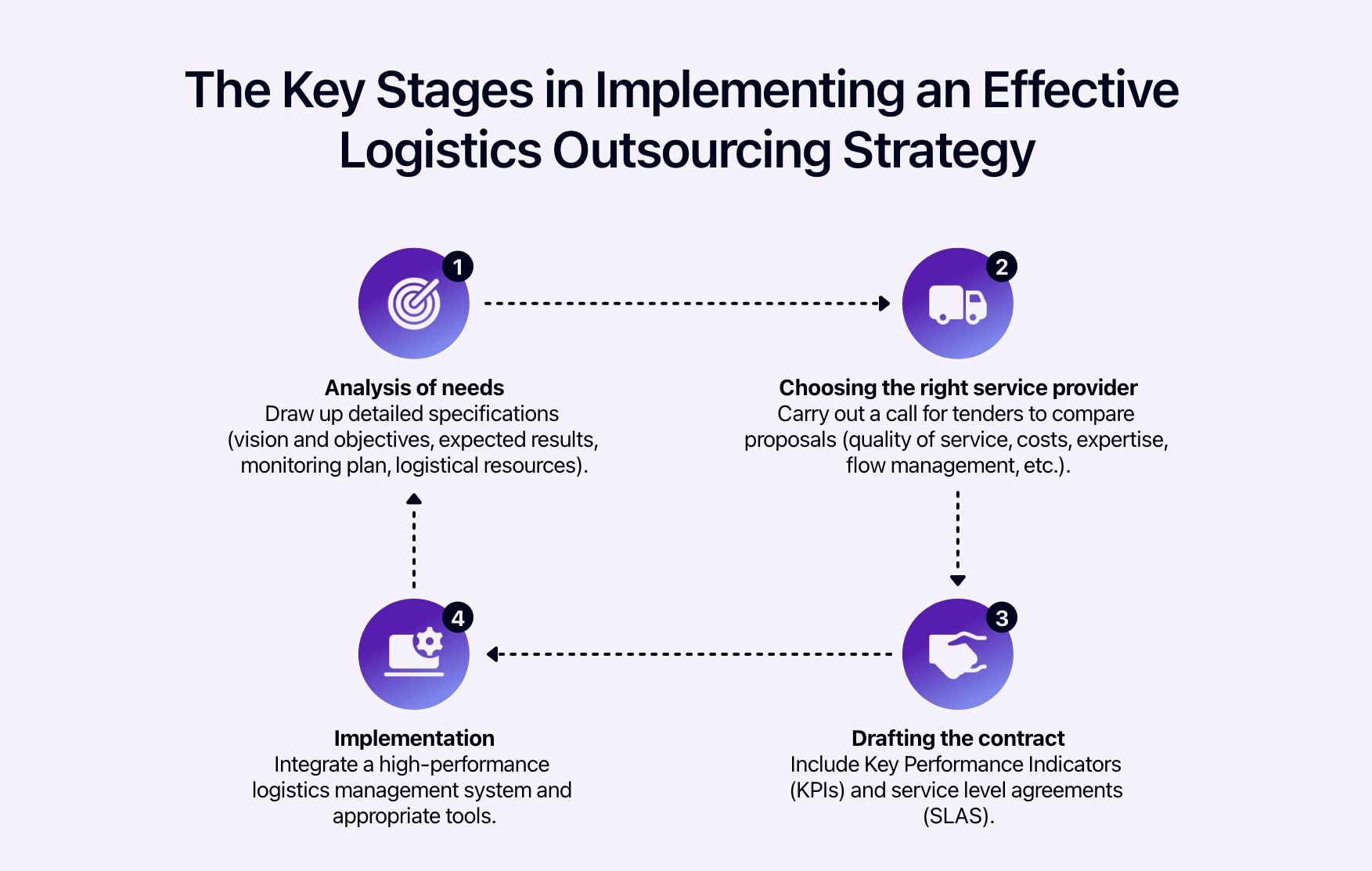
The Key Stages in Implementing an Effective Logistics Outsourcing Strategy.
Optimising the Performance of Outsourced Logistics
Monitoring and improving logistics KPIs
To ensure an effective strategy, you need to measure and continually improve the performance of your logistics partners.
Monitoring logistics KPIs: the key to success
KPIs are used to monitor key aspects:
- Delivery times: Compare actual times with forecasts to measure punctuality.
- Transport costs: Track expenditure per kilometre or tonne to control the budget.
- Complaint rates: Analyse customer feedback to identify and resolve problems.
This helps you assess the performance of your service providers and identify opportunities for improvement.
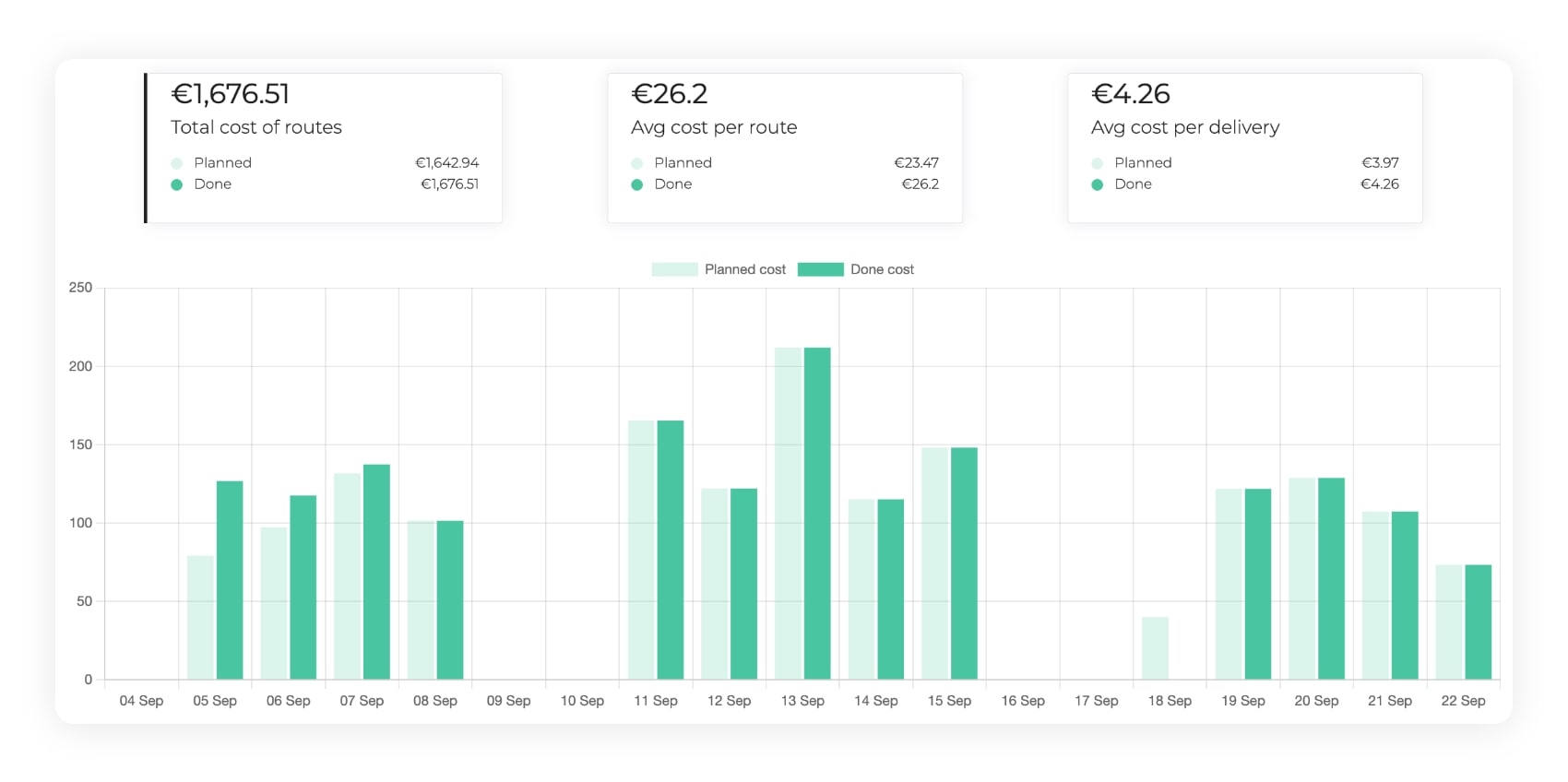
The analysis of transport route cost KPIs on AntsRoute.
Monitoring tools and dashboards
Use reporting tools and dynamic dashboards to centralise data and visualise performance in real time. Set up automatic alerts to react quickly to anomalies.
Integration of information systems with the service provider
To optimise your e-commerce, it’s important to integrate the right logistics solutions. But beware: not all service providers offer easy-to-integrate tools for managing orders, tracking deliveries or handling returns.
Make sure that your systems (CMS, WMS, OMS, marketplaces) are compatible with the technologies offered by your service provider. For optimised management, the integration of software solutions such as AntsRoute, which optimises delivery routes and centralises data, facilitates the coordination and transparency of logistics operations. Combined with an automated returns management system directly on your site, it transforms your logistics into a major asset for customer satisfaction and overall performance.
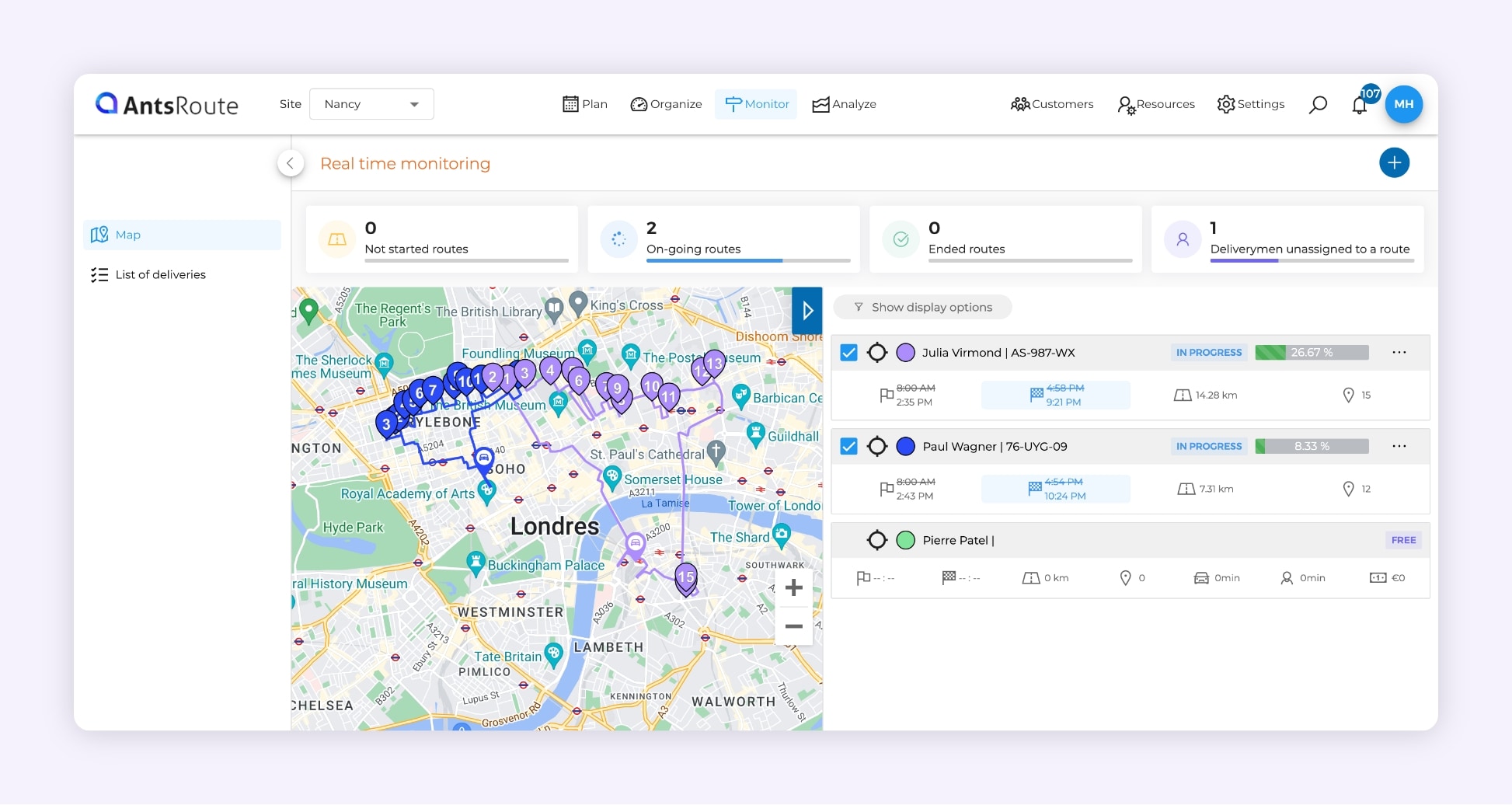
AntsRoute logistics route optimisation software.
Technological innovations and future trends
Logistics outsourcing is evolving with the arrival of new technologies such as the Internet of Things (IoT), Artificial Intelligence and Blockchain.
Internet of Things (IoT): connectivity and real-time monitoring
The IoT enables you to monitor your operations in real time using smart sensors. This technology ensures product quality and safety by monitoring transport conditions and optimising stocks, while reducing risks and losses.
Artificial Intelligence: prediction and automation
AI analyses large quantities of data to predict demand, optimise routes and automate repetitive tasks. It adjusts stock levels and customises recommendations, making your operations smoother.
Blockchain: traceability and transparency
Blockchain provides complete traceability and product authentication thanks to an immutable digital register. It simplifies transactions by eliminating intermediaries, reducing costs and strengthening trust with your partners and customers.
These technologies are not just trends, but the future of logistics. They pave the way for more efficient, transparent and agile operations management.
Would you like to try out our AntsRoute software? Now is the perfect time! Take advantage of a 7-day trial perdiod now!
WRITTEN BY
Florine Martin
Florine has been a freelance web copywriter since 2021, writing for a variety of clients in a range of sectors. Since the beginning of 2024, she has been writing articles about logistics for our company, AntsRoute.
Free 7-day trial | No credit card required
Contenu
- Play Podcast
- Logistics Outsourcing: Overcoming Fears and Uncertainties
- What is Logistics Outsourcing?
- Why Considering the Outsourcing?
- The benefits
- The disadvantages
- When Should I Outsource Logistics?
- The signals to look out for
- Cost-benefit analysis: in-house logistics vs. outsourcing
- Performance: compare to make better decisions
- Costs: optimise your resources
- Financial impact: more than just a question of costs
- Adequacy: a strategic choice
- Developing a hybrid approach
- The Key Stages in Implementing an Effective Logistics Outsourcing Strategy
- 1. Analysis of needs
- 2. Choosing the right service provider
- 3. Drafting the contract
- 4. Implementation
- Optimising the Performance of Outsourced Logistics
- Monitoring and improving logistics KPIs
- Monitoring logistics KPIs: the key to success
- Monitoring tools and dashboards
- Integration of information systems with the service provider
- Technological innovations and future trends
- Internet of Things (IoT): connectivity and real-time monitoring
- Artificial Intelligence: prediction and automation
- Blockchain: traceability and transparency


